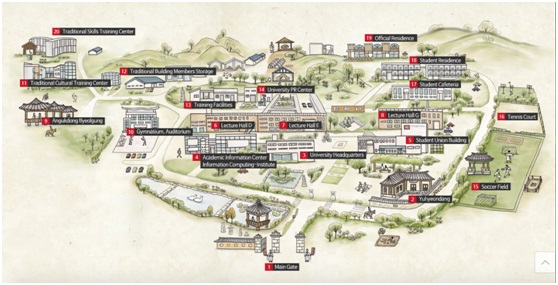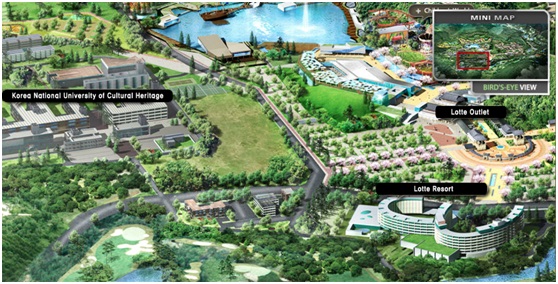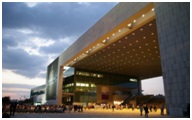Nov. 5 – Nov. 10, 2018
3rd IASSRT symposium
International Association for the Study of Silk Road Textiles Symposium
Korea National University of Cultural Heritage (KNUCH) in Buyeo, Korea
I. Description
“Silk Road Textiles: Tangible and Intangible Cultural Heritage” Symposium and 3rd IASSRT meeting will be held from Nov. 5 to Nov. 10, 2018 in Buyeo, Republic of Korea. The symposium will make in-depth discussion on the important tangible and intangible cultural heritage on textiles along the Silk Road, including Korean and Asian textile traditions, textiles on the Eastern Silk Road, textiles on the Steppe Silk Road, textiles along the Maritime Silk Road, Eastern textiles in European collection, and new researches on the Silk Road textiles.
● Host: International Association for the Study of Silk Road Textiles (IASSRT)
● Co-organizers: Korea National University of Cultural Heritage, China National Silk Museum
● Co-Chairmen: Sim Yeon-ok, Feng Zhao
II. Program
Day 1 Nov 5 (Mon.)
09:00- 17:00 International symposium registration at Lotte Resort in Buyeo
15:00-16:00: ISU meeting at Conference Room at the 3rd floor of University Headquarter (see No.3 on University Map)
18:00-20:00: IASSRT board meeting at Conference Room
Day 2 Nov 6 (Tue.)
At Grand Lecture Hall at the 2nd floor of Academic Information Center (see No.4 on University Map)
09:00-09:15 Opening ceremony for the IASSRT symposium
09:15-09:40 Ribbon Cutting Ceremony of the exhibition of Reproduction of Korean traditional clothing and textiles
All attendees Photo-op
At Angukdong Byeolgung (see No.9 on University Map)
Nov 6 (Tue.) 09:40-11:00 Panel 1: General History of Textiles on the Silk Road | |||
1 | Claudio Zanier | Padova University, Italy | The Migration of Chinese White Mulberry to Europe |
2 | Dominique Marie Cardon | Centre national de la recherche scientifique (C.N.R.S) | The beautiful story of celadon green |
3 | Susan Whitfield | Consultant/Researcher on Arrival of Belief project, University of East Anglia Former head of IDP | The Lost Silks of Buddhist Practice |
Nov 6 (Tue.) 11:00-12:20 Panel 2: Textiles on the Korean Traditions | |||
4 | Park Seungwon | Daegu National Museum | The Archaeological Textile Excavated from Baekje Cultural Areas |
5 | Lee Seonyong | Korea National University of Cultural Heritage | The Embodiment of Religion and Faith : the Textile Found in Korean Buddhist Statue |
6 | Sim Yeonok | Korea National University of Cultural Heritage | Analysis and production significance of Textile from the Gilt-bronze seated Bhaisajyaguru (Medicine Buddha) Statue in Janggoksa Temple |
Nov 6 (Tue.) 13:40-15:40 Panel 3: Textiles on the Eastern Silk Road | |||
7 | Tanaka Yoko | The office of the Shoso-In Treasure house The imperial household agency | Plant fiber textiles from Shosoin Collection |
8 | Aki Yamakawa | Kyoto National Museum | Quilted kasaya made in 8th to 10th centuries |
9 | Xu Wenyue | Independent scholar | Several robes and fabrics introduced into Korea at the end of the Ming Dynasty |
10 | Wang Shujuan | China National Silk Museum, Hang Zhou | Comparison of Women's Costumes between China and Korea in the 16th century——Based on the conservation project of textiles excavated from Wangdian in Jiaxing, Zhejiang |
11 | Alina Kazmina | Nasledie (Stavropol) Ltd., | Mongol Robe: Restoration Experience |
Nov 6 (Tue.) 16:00-18:00 Panel 4: Maritime Silk Road Textiles | |||
12 | David Celletti | Padova University, Italy | The “Istituto Bacologico” of Padua. History and perspectives. |
13 | Mao Huiwei | Zhejiang Institute of Textile and Clothing, Ningbo | A comparative study of patchworks along the Silk Road |
14 | Monica Bethe | Medieval Japanese Studies Institute | Transported from China or Transformed in Japan? 13th and 14th Century 3-end Gauze Weave Fabrics Preserved in Japan |
15 | Yoshida masako | Kyoto City University of Arts | Tapestries brought to Japan through Maritime Silk Road and their influence |
16 | Laretna Trisnantari Adishaki | Gajah Mada University, Yogyakarta, Indonesia | Conserving Maritime Silk Road and Archipelago Tangible in Indonesia |
18:00-20:00 Welcome Dinner
Day 3 Nov 7 (Wed.)
At Grand Lecture Hall at the 2nd floor of Academic Information Center (see No.4 on University Map)
Nov 7 (Wed.) 09:00-10: 40 Panel 5: Textiles on the Northwest Silk Road | |||
17 | Minsun Hwang | Metropolitan Museum of art | Textile Treasures from the Han Dynasties Textiles from “Age of the Empires: Chinese Art of the Qin and Han Dynasties (221 B.C.~A.D.220)” |
18 | Wang Le | Donghua University, Shanghai | Study on the Clothing of the 4th Century in Northwest China: Based on the Two Wooden Figurines Excavated from Astana |
19 | Maria Menshikova | State Hermitage Museum, Russia | Some Textiles of the 12-14th centuries excavated at Khara-Khoto by P.K. Kozlov at the beginning of the 20th century |
20 | Melodie Doumy | British Library | Unfolding a textile fragment from Kharakhoto (working title) |
Nov 7 (Wed.) 11:00-12:20 Panel 6: Textiles on the Steppe Silk Road | |||
21 | Zvezdana Dode | Nasledie (Stavropol) Ltd., Southern Scientific Centre of Russian Academy of Sciences (SSCRAS) | Silk Samit textiles in the burials of nomads: the problem of dating archaeological complexes |
22 | Sofia Shashunova | Volgo-Don archaeological society | Golden Horde textiles in the collection of the Volgograd Museum of Local Lore |
23 | Hikmatillo Hoshimov | Uzbekistan Academy of Sciences Institute for archeological research | Early sample of silk in Central Asia |
Nov 7 (Wed.) 13:40-15:20 Panel 7: Intangible Cultural Heritage of Textiles in Asia | |||
24 | He Zhaohua | Fashion and Textiles College Fu Jen Catholic University Taiwan | Art of Counting Threads among Miao Weaving and Embroidery in Guizhou Province |
25 | An Weizhu | Donghua university, Shanghai | Printed textiles in India |
26 | Mallakhonov sayidafzal | National Commission of Uzbekistan for UNESCO, Uzbekistan | Ikat Fabrics of Uzbekistan |
27 | Susanne Lervad | The Center for Textile Research (CTR), University of Copenhagen | Traditional Textile Craft – an Intangible Cultural Heritage |
Nov 7 (Wed.) 15:40-18:40 Panel 8: New Research on the Silk Road Textiles | |||
28 | Helen Persson | Nordic Museum (Nordiska museet), Stockholm, Sweden | Social and visual culture of silk road textiles and east Asian influence on Swedish fashion |
29 | Kyunghee Pyun | Fashion Institute of Technology, State University of New York | Pedagogical Challenges of Silk Road Textiles: 20 Years after When Silk Was Gold: Central Asian and Chinese Textiles |
30 | Anna Maria Muthesius | McDonald Institute, University of Cambridge | Silk as tangible and intangible heritage across cultures of the Silk Road (4-15 centuries) |
31 | Baichun Zhang | Institute for the History of Natural Science, Chinese Academy of Sciences | notes/remarks on international contruction of a digital loom museum |
32 | Helen Wang | British Museum | How important is the silk in Silk Road exhibitions? |
33 | Zhao Feng | China National Silk Museum, Hang Zhou | Two Projects for the IASSRT: Global History of Silk & World Map of Looms |
Day 4 Nov 8 (Thu.)
08:00-09:00 Move from Buyeo to Seocheon
Nov 8 (Thu.) 09:00-11:20 Panel 9: Workshop | |||
34 | Transmission Hall of Hansan Mosi | A whole process of weaving Mosi (fine ramie) | Exhibition of Weaving Mosi (fine ramie) in Hansan region, which is inscribed on the Representative List of the Intangible Cultural Heritage of Humanity by UNESCO |
11:30-12:30 Lunch
12:30-13:30 Move from Seocheon to Jeonju
Nov 8 (Thu.) 14:00-16:00 Panel 10: Workshop | |||
35 | National Intangible Heritage Center | Observing demonstration of a Human Treasure | Exhibition of Korea and China’s Intangible Cultural Heritage: Silk |
16:00-17:30 Reception at National Intangible Heritage Center
17:30-20:00 Move from Jeonju to Seoul (the Capital)
Day 5 Nov 9 (Fri.)
08:00-08:40 Move to the National Museum of Korea
Nov 9 (Fri.) 09:00-12:00 Panel 11: Workshop | |||
36 | National Museum of Korea | Research on silk relics in the museum | Textile conservation center |
12:00-13:00 Lunch
13:00-14:00 Free time to look around galleries in the museum
14:00-15:00 Move to Kyung-woon Museum
Nov 9 (Fri.) 15:00-17:00 Panel 12: Workshop | |||
37 | Kyung-woon Museum | Special lectures regarding colors | Exhibition of A story of beautiful color harmony showing through the Korean Traditional Clothes |
17:00-18:00 Move to Sebitseom (the three glowing islands that brighten the vista of the Han River)
18:00-21:00 Closing ceremony at Chavit Cuisine (Premium buffet restaurant)
Day 6 Nov 10 (Sat.)
Departure
III. Accommodations/Transportations/Fees:
1. PICK-UP SERVICE FROM THE ICN AIRPORT
A. The ICN Airport-University (Buyeo) pick up service will run only at 4th-5th Nov with 10 vans. Each van holds 6 people.
* All attendees should send their flight information to KNUCH. Attendees will meet University staff at the arrival gate. Once KNUCH receive their flight information, KNUCH will give further notice.
B. Attendees who arrive at ICN on the other day (other than 4th or 5th), there will be no pick-up service from KNUCH but it only gives information about Limousine bus or Van service which move ICN Airport to University (Buyeo) directly. Limousine bus service has two time slots (at 10:30, 17:00) per one day at ICN Airport Terminal 1. (Will notice if there is any time slot change of this service.)
2. FEE FOR APPLYING THE SYMPOSIUM
All the attendees and participants will pay $100 as fee for applying the symposium.
3. ACCOMMODATION DURING THE SYMPOSIUM
The symposium duration, location: 6th to 7th Nov in Buyeo
Hotel: Lotte Resort Buyeo
Room type:
For speakers- a TWIN ROOM (two persons in one room) will be given during the symposium (5, 6, 7th Nov). If any speaker wants a single room, there will be EXTRA CHARGE ($60 per one day)
For participants- the University HELPS TO BOOK one's room as one's wish. (rooms are on your own)
For students- the University offers a FREE TWIN ROOM (two persons in one room).
Meal: All the meals during the symposium will be given for all attendees for free.
4. FEE FOR APPLYING THE STUDY TOUR
The study tour duration, location: 8th to 9th Nov in Seoul
Hotel: Silla stay Gwanghwamun in Seoul
Fee: $100, including accommodation, meal and transportation from 8th to 9th
Fee for the study tour was $50, however, it is changed to $100 as including the accommodation.
A TWIN ROOM (two persons in one room) will be ready for all participants but if anyone wants a single room, there will be EXTRA CHARGE ($60 per one day)
5. TRANSPORTATION FROM SEOUL TO ICN AIRPORT
KNUCH can help to guide where they can take Airport Limousine bus or Airport train nearby the accommodation.
IV. Maps
A. University map


B. map for study tour

1. Buyeo | |
 | Korea National University of Cultural Heritage 367, Baekjemun-ro, Gyuam-myeon, Buyeo-gun, Chungcheongnam-do, 33115, Rep. of KOREA
|
2. Seocheon | |
| Transmission hall of Hansan Mosi 1146, Chungjeol-ro, Hansan-myeon, Seocheon-gun, Chungcheongnam-do |
3. Jeonju | |
 | National Intangible Heritage Center 95, Seohak-ro (896-1, Dongseohak-dong), Wansan-gu, Jeonju-si, Jeonbuk, Republic of Korea
|
4. Seoul | |
 | National Museum of Korea 137 Seobinggo-ro, Yongsan-gu, Seoul, 04383, Republic of Korea
|
| Kyung-woon Museum 29, Samseong-ro, Gangnam-gu, Seoul, Republic of Korea |
I. Contact:
Ko Woori: kowoori_nuch@naver.com (Korea)
Irene Lu: irenelu_hz@163.com (China)
Sophia Liang: hensophia@qq.com (China)
Notes:
● Working language: English
● For more information, please link to:
http://www.nuch.ac.kr/english/main.do
http://www.chinasilkmuseum.com/
 Pay attention to us
×
Pay attention to us
×